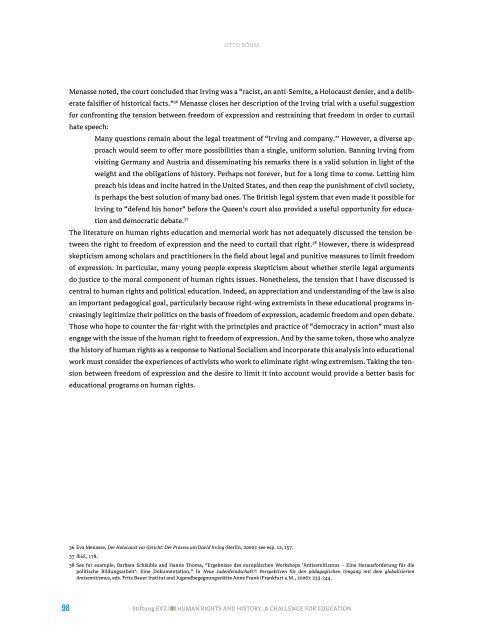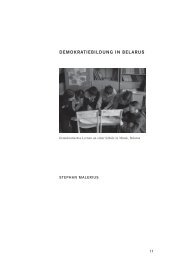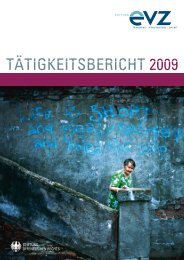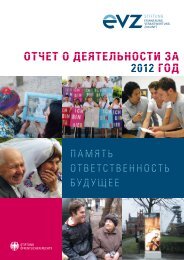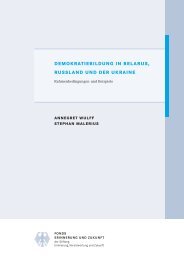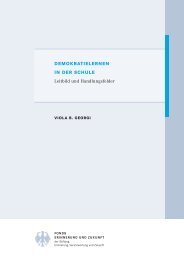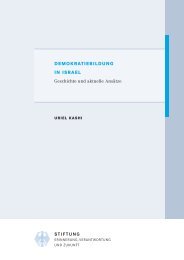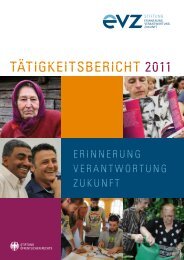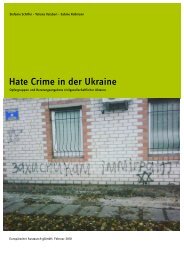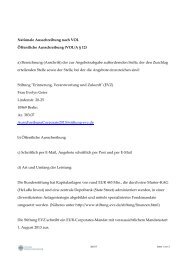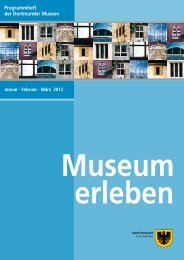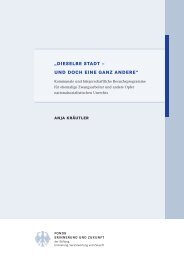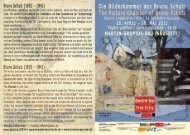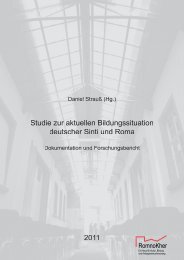chapter 2 - Stiftung "Erinnerung, Verantwortung und Zukunft"
chapter 2 - Stiftung "Erinnerung, Verantwortung und Zukunft"
chapter 2 - Stiftung "Erinnerung, Verantwortung und Zukunft"
You also want an ePaper? Increase the reach of your titles
YUMPU automatically turns print PDFs into web optimized ePapers that Google loves.
Otto Böhm<br />
Menasse noted, the court concluded that Irving was a “racist, an anti-Semite, a Holocaust denier, and a deliberate<br />
falsifier of historical facts.” 36 Menasse closes her description of the Irving trial with a useful suggestion<br />
for confronting the tension between freedom of expression and restraining that freedom in order to curtail<br />
hate speech:<br />
Many questions remain about the legal treatment of “Irving and company.’’ However, a diverse approach<br />
would seem to offer more possibilities than a single, uniform solution. Banning Irving from<br />
visiting Germany and Austria and disseminating his remarks there is a valid solution in light of the<br />
weight and the obligations of history. Perhaps not forever, but for a long time to come. Letting him<br />
preach his ideas and incite hatred in the United States, and then reap the punishment of civil society,<br />
is perhaps the best solution of many bad ones. The British legal system that even made it possible for<br />
Irving to “defend his honor” before the Queen’s court also provided a useful opportunity for education<br />
and democratic debate. 37<br />
The literature on human rights education and memorial work has not adequately discussed the tension between<br />
the right to freedom of expression and the need to curtail that right. 38 However, there is widespread<br />
skepticism among scholars and practitioners in the field about legal and punitive measures to limit freedom<br />
of expression. In particular, many young people express skepticism about whether sterile legal arguments<br />
do justice to the moral component of human rights issues. Nonetheless, the tension that I have discussed is<br />
central to human rights and political education. Indeed, an appreciation and <strong>und</strong>erstanding of the law is also<br />
an important pedagogical goal, particularly because right-wing extremists in these educational programs increasingly<br />
legitimize their politics on the basis of freedom of expression, academic freedom and open debate.<br />
Those who hope to counter the far-right with the principles and practice of “democracy in action” must also<br />
engage with the issue of the human right to freedom of expression. And by the same token, those who analyze<br />
the history of human rights as a response to National Socialism and incorporate this analysis into educational<br />
work must consider the experiences of activists who work to eliminate right-wing extremism. Taking the tension<br />
between freedom of expression and the desire to limit it into account would provide a better basis for<br />
educational programs on human rights.<br />
36 Eva Menasse, Der Holocaust vor Gericht: Der Prozess um David Irving (Berlin, 2000): see esp. 12, 157.<br />
37 Ibid., 178.<br />
38 See for example, Barbara Schäuble and Hanne Thoma, “Ergebnisse des europäischen Workshops ‘Antisemitismus – Eine Herausforderung für die<br />
politische Bildungsarbeit’: Eine Dokumentation,” in Neue Judenfeindschaft?: Perspektiven für den pädagogischen Umgang mit dem globalisierten<br />
Antisemitismus, eds. Fritz Bauer Institut and Jugendbegegnungsstätte Anne Frank (Frankfurt a.M., 2006): 233-244.<br />
98<br />
<strong>Stiftung</strong> EVZ<br />
HUMAN RIGHTS AND HISTORY: A CHALLENGE FOR EDUCATION


